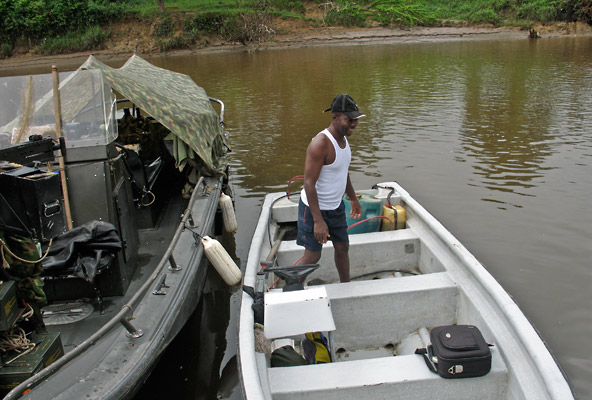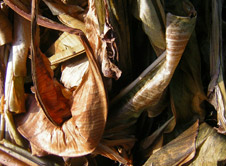
June 2007, Rio Patia, Colombia. A guide moors his boat next to a piraha, a fast skiff equipped with .50 caliber machine gun used by the Colombian military for patrols. FARC, the dominant rebel group in the country, uses the rivers as highways and still controls a large part of the impassable jungle zones.
Photo: Phillip Robertson
There are beggars and a mentally-retarded boy who hang around the gates of the maximum security prison at Itagui looking for tips. One old woman offers to clean the fingerprint ink from your hands when you leave in exchange for a few coins. It is a good business because everyone has ink-stained hands if they leave through the gates. This was the most important aspect of the security at Itagui, the pressing of blackened digits into ledgers. The guards were relaxed and so were the senior officials and the secretaries in their clean blue uniforms with their American-style velcro patches. Everyone was having a normal day in a beautiful town in the Andes behind a high fence. Above us the mountains intercepted the clouds.
The guards waved me through the checkpoints in a friendly and reassuring way. A few minutes later, I was waiting in an office in the administration building for Salvatore Mancuso, leader of the AUC, to appear-but he didn't appear. Out in the hall an official from the Colombian prosecutor's office was also waiting to talk to Mancuso but he wouldn't come into the room. The young prosecutor walked in slow circles in the dark hallway, waved once, and then went back into the gloom.
A senior prison official came in after an hour and apologized for the delay. "I am sorry. Mr. Mancuso is getting a massage from a girl and he has to shower and get dressed. He will come and talk to you when he is ready," he explained.
"His life here is very slow," I said. Mancuso was going to make us all wait so we would know who was in charge.
"It certainly is. Patience is very important," the officer said and smiled sadly. We waited in the office a long time, long enough to notice how the light changed on the mountains. The prosecutor who was waiting outside finally couldn't take it any more and came into the office with me. He sat at a nearby desk. The prosecutor held some information about me in a portfolio that he wanted to verify. I could hear the leader's voice coming up the stairs before he came through the door. Mancuso has a great voice, a deep baritone that could have come from the opera house. The boss brought two of his friends with him. One of them, an older professorial man named Juan Rubbini, edits his website-salvatoremancuso.com-and writes about the AUC political program. The boss towered over them all. Salvatore Mancuso, the former English student at the University of Pittsburgh who became the leader of the AUC following the death of Carlos Castaño was now ready for his audience. In the past, he has implicated officials as high as the Colombian Vice President in connection with paramilitary groups, and he is still a powerful man.
We all shook hands and then Mancuso disappeared with the official from the prosecutor's office and promised to return soon. Under the Justicia y Paz law, Mancuso is supposed to confess the details of crimes he committed while he ran the AUC. In exchange, he is allowed to serve a comfortable eight-year sentence in Colombia. The government has not taken his money or forced him to reveal the exact extent of his criminal organization.
Mancuso's comforts in prison abound. The former head of the AUC has Internet in his cell, a phone, and regular visits from friends and family. In fact, he has the run of the place and walks around without an armed escort. The guards call him by his first name. In May, La Semana, an investigative weekly in Colombia, published a report based on telephone and email intercepts of paramilitary members in Cellblock 1 where Mancuso lives. In the intercepted calls, men close to AUC leaders instructed men on the outside to continue extortion schemes and commit murder. One man close to Mancuso called El Flaco was recorded as he handled orders for the purchase and sale of cocaine. It would appear from these conversations that the AUC, all cooped up in a single cellblock in Itagui, did not give up all of its power. AUC duros on the outside still wait for orders.
Rubbini, Mancuso's friend, turned to me while I waited for Mancuso to return and said, "This man demobilized thirty-thousand men and they put him in a prison!" I said I thought it was remarkable. Rubbini clearly loves Mancuso and admires him and spends serious time writing down his political views. Finally the boss returned and I had to ask the other two men to leave.
Mancuso was nervous at first. It might be that he doesn't often speak to Americans or that he doesn't trust the press. When I took out my recorder, Mancuso produced his own digital voice recorder and asked if it would bother me if he used it. I said, no problem at all.
I started by asking him about his political ideas. It was the FARC that started the whole business with coca, he told me, and that's how the AUC got interested in it.
Finally, when he seemed completely at ease, I asked Mancuso about Chiquita and the shipment of weapons that arrived at the Chiquita docks on the Otterloo in November 2001. Mancuso's demeanor instantly changed as he listened to the question. It was an intense moment, watching him respond to an unexpected development, calculating his odds, weighing his answer more carefully. He began by appealing for an appreciation of the broader milieu.
"What must also be clearly understood is the historical context that existed at that time. What were the pressures [Chiquita] faced, what was happening with them in that area. The part of Urabá where they had their banana investments was completely dominated by the guerillas. The Colombian state was precarious there. They had to do what the guerillas told them. In fact, they were thinking of selling their property and leaving the country at that time. When we entered the area and confronted the guerilla phenomenon, we told them, 'Look, you are the best generators of jobs, of labor, of stability in the area. Stay here, don't leave, keep investing. We'll provide you with protection, but in exchange for that we want you to pay a tax.'" On the central question of drug exports from the Banadex port, Mancuso said in his clear, educated Spanish, "In the specific case of Chiquita, I don't know. But surely they must have loaded up a lot of ships there. Now, I don't know if Chiquita had its own fleet or not. I think that they didn't have one, that the ships that came in were from the shipping line, and surely those boats were used and loaded with drugs."
In fact, from the time of the weapons shipment until 2003, Chiquita maintained its own fleet of ships, which regularly used port facilities in Urabá, the site controlled by the AUC. These are the boats that Lorenzo described trusted men with loading the cocaine. Mancuso tried more than once to say that it was the drug traffickers who managed the smuggling, not the AUC, but this is hard to believe for a number of reasons, not the least being Mancuso's own description of his organization's involvement in the trade. His evasiveness is understandable; he is under an extradition threat and does not want to admit to more direct knowledge of drug smuggling than he has to.
 LEAD IMAGE: Dried banana leaves.
LEAD IMAGE: Dried banana leaves.Photo: Unknown
© Phillip Robertson, 2009-2014.
